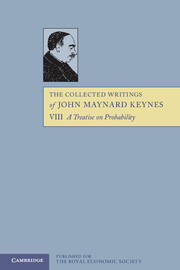Book contents
- Frontmatter
- Contents
- General Introduction
- Editorial Foreword by R. B. Braithwaite
- Editorial Note
- Preface to the First Edition
- I FUNDAMENTAL IDEAS
- 1 THE MEANING OF PROBABILITY
- 2 PROBABILITY IN RELATION TO THE THEORY OF KNOWLEDGE
- 3 THE MEASUREMENT OF PROBABILITIES
- 4 THE PRINCIPLE OF INDIFFERENCE
- 5 OTHER METHODS OF DETERMINING PROBABILITIES
- 6 THE WEIGHT OF ARGUMENTS
- 7 HISTORICAL RETROSPECT
- 8 THE FREQUENCY THEORY OF PROBABILITY
- 9 THE CONSTRUCTIVE THEORY OF PART I SUMMARISED
- II FUNDAMENTAL THEOREMS
- III INDUCTION AND ANALOGY
- IV SOME PHILOSOPHICAL APPLICATIONS OF PROBABILITY
- V THE FOUNDATIONS OF STATISTICAL INFERENCE
- Bibliography
- Index
6 - THE WEIGHT OF ARGUMENTS
from I - FUNDAMENTAL IDEAS
Published online by Cambridge University Press: 05 November 2012
- Frontmatter
- Contents
- General Introduction
- Editorial Foreword by R. B. Braithwaite
- Editorial Note
- Preface to the First Edition
- I FUNDAMENTAL IDEAS
- 1 THE MEANING OF PROBABILITY
- 2 PROBABILITY IN RELATION TO THE THEORY OF KNOWLEDGE
- 3 THE MEASUREMENT OF PROBABILITIES
- 4 THE PRINCIPLE OF INDIFFERENCE
- 5 OTHER METHODS OF DETERMINING PROBABILITIES
- 6 THE WEIGHT OF ARGUMENTS
- 7 HISTORICAL RETROSPECT
- 8 THE FREQUENCY THEORY OF PROBABILITY
- 9 THE CONSTRUCTIVE THEORY OF PART I SUMMARISED
- II FUNDAMENTAL THEOREMS
- III INDUCTION AND ANALOGY
- IV SOME PHILOSOPHICAL APPLICATIONS OF PROBABILITY
- V THE FOUNDATIONS OF STATISTICAL INFERENCE
- Bibliography
- Index
Summary
1. The question to be raised in this chapter is somewhat novel; after much consideration I remain uncertain as to how much importance to attach to it. The magnitude of the probability of an argument, in the sense discussed in chapter 3, depends upon a balance between what may be termed the favourable and the unfavourable evidence; a new piece of evidence which leaves the balance unchanged, also leaves the probability of the argument unchanged. But it seems that there may be another respect in which some kind of quantitative comparison between arguments is possible. This comparison turns upon a balance, not between the favourable and the unfavourable evidence, but between the absolute amounts of relevant knowledge and of relevant ignorance respectively.
As the relevant evidence at our disposal increases, the magnitude of the probability of the argument may either decrease or increase, according as the new knowledge strengthens the unfavourable or the favourable evidence; but something seems to have increased in either case,—we have a more substantial basis upon which to rest our conclusion. I express this by saying that an accession of new evidence increases the weight of an argument. New evidence will sometimes decrease the probability of an argument, but it will always increase its ‘weight’.
2. The measurement of evidential weight presents similar difficulties to those with which we met in the measurement of probability. Only in a restricted class of cases can we compare the weights of two arguments in respect of more and less.
- Type
- Chapter
- Information
- The Collected Writings of John Maynard Keynes , pp. 77 - 85Publisher: Royal Economic SocietyPrint publication year: 1978



